|
|
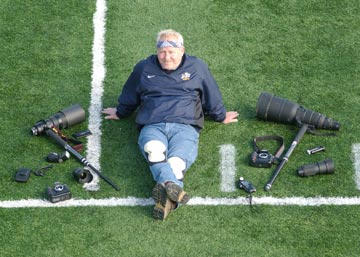 |
|
photo by Alison Harbaugh
|
Photographer Phil Hoffmann Makes
a Job of What You Do for Fun
story by Nancy Hoffmann
All photos by Phil Hoffman, unless otherwise noted.
Phil Hoffmann — Baltimore Ravens’ team photographer and director of photography for the Naval Academy Athletic Association — spends his working hours photographing all kinds of sporting events from football to basketball to cross-country to gymnastics. It sure seems like every sports fan’s dream job. But is it all fun and games? We spent a football-filled weekend with Hoffmann to find out.
Friday, October 4, 2002
10am ~ The start of a football weekend
Hoffmann boards the Navy Football Team bus in Annapolis for the short drive to BWI Airport. He’ll first travel with Navy to Colorado Springs, Colorado, where the Midshipmen will face the U.S. Air Force Academy Falcons. From Colorado, Hoffmann will fly to Cleveland, Ohio, to photograph the Ravens’ game against the Browns.
Hoffmann has been photographing Navy sports for almost 20 years and the Ravens since they came to Baltimore in 1996. After all those years, he enjoys the tension of entering another team’s home turf.
“I love going on the bus with the team into the enemy stadium,” he says. “The fans are yelling at you, shaking their fists and giving you the thumbs down.”
11:25am–2:45pm ~ Flight to Colorado Springs
Working on his laptop computer, Hoffmann finishes editing the pictures from Navy’s loss to Duke the previous weekend. Shooting with digital cameras, he takes some 400 photographs every football game. That’s the fun part. In the days after the game, he has to upload the pictures to his computer then edit, crop, sharpen and save them.
 |
|
Phil boards the bus.
photo by Alison Harbaugh
|
4pm ~ Falcon Stadium
The Navy team is bused to Falcon Stadium.
“College teams always go straight to the stadium from the airport,” says Hoffmann. “It gives the players a chance to walk around and check out the locker room. But the pros don’t go to the stadium until game day.”
5:25pm ~ Hoffmann arrives at the hotel
Players and coaches spend the evening in meetings and looking at video clips of the Falcons. Hoffmann and other members of the Navy staff find a Mexican restaurant for dinner and then gather in the hotel bar.
“There’s normally a game on that we watch,” says Hoffmann. “And we talk about football and Navy’s chances the next day.”
Unfortunately, Navy’s (1-3) chances against Air Force (4-0) aren’t good.
Hoffmann, a Naval Academy grad, doesn’t want to give up on his team. He insists that in a service academy rivalry, anything can happen.
Saturday, October 5, 2002
9am ~ Wake up
11:45am ~ Hoffmann arrives at Falcon Stadium
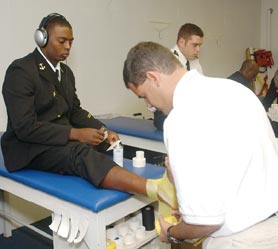 |
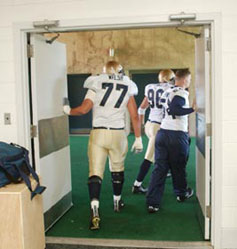 |
|
Players get taped, left, before heading out of the locker room and onto the field, right.
|
1pm: Hoffmann walks through Navy’s locker room and the training room where the players are taped. The scene never fails to move him.
“Guys are throwing up and sweating through their shirts,” he says. “It’s the anticipation and the fear. Some players are kneeling at their lockers and praying. There’s a significant chance of injury and always the remote possibility of serious injury,” he says.
A walk around the stadium allows Hoffmann to check the background and the light. Today, his problem is the bright sun. The players’ faces will be lost in the shadows of their helmets.
From his favorite position behind the end zone, Hoffmann can shoot most of the field. “With my longest lens,” he explains, “a player standing on the 50-yard line looks like he’s standing right next to me on the end line.
“I see things the fans don’t see,” he says. “Blood on the players, beads of sweat rolling down their faces, steam coming off them or their breath on a cold day. It’s a very intimate view.”
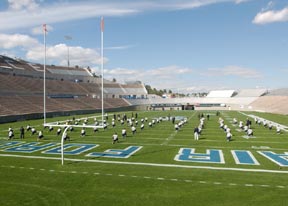 |
|
Players stretch out on the field at Falcon Stadium.
|
Two cameras, four lenses, a light meter, spare batteries and a flash — nearly 60 pounds worth of equipment — are what Hoffmann carries on the field.
“In baseball, you sit in a box, and in basketball you can cover a game from one end line,” he says. “But with football, you move a lot more and walk or run up and down the field all day, trying to move during the huddle.”
Hoffmann also kneels while he shoots the game.
“Most people watch a football game looking down onto the field,” he says. “Kneeling lets me capture a view that people don’t usually see. It also makes the players look bigger, and the background becomes the fans instead of the stadium wall.”
All photographers must stay behind the dotted line that encircles the field, but the play can spill over the sidelines. Kneeling helps Hoffmann avoid getting run down by the players.
“They’re coming too fast for you to move out of the way,” he says. “The best thing to do is crouch down, and they’ll jump over you.”
3pm ~ Kickoff
One technique Hoffmann uses is to focus on a player and wait for something good to happen.
“I’ll stick with that player unless I hear the crowd roar,” he says. “If the crowd suddenly gets loud and I don’t see anything exciting through the camera, I have to go find it.”
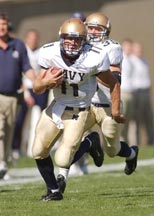 |
|
Quarterback Craig Candeto’s 48-yard run.
|
Navy runs an option offense, and Hoffmann rarely goes wrong zeroing in on quarterback Craig Candeto.
The Midshipmen come charging down the field when Candeto breaks free for a 48-yard run. But the Navy drive stalls, and Air Force takes control of the game.
“After the first quarter, nothing was going Navy’s way,” Hoffmann says. “Which also makes it difficult to photograph. I shoot facing Navy and, all day, my team is moving farther and farther away from me.”
That doesn’t mean Hoffmann can relax. “I don’t focus only on the big plays the way a newspaper photographer would,” he says. “I’m working to produce a larger body of work that will be used for posters, game-day programs, media guides and promotional pieces.”
Sometimes Hoffmann captures the action perfectly, but it’s not the action he wants.
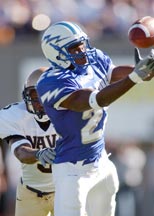 |
|
Air Force’s Interception.
|
Late in the game, Navy is driving, hoping to salvage some pride. Hoffmann is focused on Navy’s wide receiver when an Air Force player jumps up and intercepts the ball in the end zone. And that ends the game, with Navy losing 48-7.
6:30pm ~ Hoffmann leaves Falcon Stadium
7pm: With a police escort, the Navy team bus heads to the airport. Unescorted, Hoffmann returns to his hotel room.
9pm: After dinner in the hotel restaurant, Hoffmann uploads the photographs to his computer and watches football.
Sunday, October 6, 2002
9am ~ Wake up
10:15am ~ Arrive Colorado Springs Airport
11:55am–4:20pm ~ Hoffmann travels to Cleveland, Ohio
More travel gives Hoffmann time to begin editing the Navy game pictures. On a two-hour layover in St. Louis, he watches the New England Patriots–Miami Dolphins game while waiting at the gate.
4:30–5pm ~ Cab ride to Cleveland Browns Stadium
The cabbie spends the ride telling Hoffmann how the Browns are going to destroy the Ravens tonight. He also offers his opinion of the Browns’ quarterback, Tim Couch: “He stinks.” Hoffmann listens, but doesn’t say he’s the Ravens photographer.
Once inside the stadium, Hoffmann walks through the Ravens’ training room, locker room and equipment room. He didn’t travel with the Ravens, so he has to find out where the support staff ate dinner last night and the jokes everyone told.
Equipment manager Ed Carroll, who brought another of Hoffmann’s lenses to Cleveland, heard the Navy score. “Tough game,” he says, and Hoffmann can only agree.
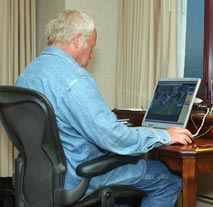 |
|
After a day on the field, Hoffmann’s work continues into the night as he edits his pictures on a laptop.
photo by Alison Harbaugh
|
5:30pm: Hoffmann sets up his laptop in the press box and checks in with Francine Lubera, the Ravens’ director of publications and assistant director of public relations.
At the end of every quarter, a runner will meet Hoffmann on the field and take one of his compact flash cards — the digital equivalent of film on which the photos are saved in the camera — to Lubera in the press box. Working on Hoffmann’s computer, Lubera will select a photo, crop it and have it posted on the Ravens’ website.
While Hoffmann chats with Lubera, his Naval Academy classmate Matt Lechleitner arrives at the stadium. Lechleitner lives in Cleveland and every year helps Hoffmann carry his equipment during the Browns games.
“I try to find a friend in every city to help with my gear,” says Hoffmann. “I have another classmate in Pittsburgh, a coaching friend in Miami and Navy’s video coordinator hooked me up with a friend in Philadelphia.”
6pm ~ Hoffmann and Lechleitner eat dinner in the press box
“It was some kind of a chicken thing,” Hoffmann says. “The food is mediocre in every press box.”
7:15pm: Hoffmann is on the field checking his equipment, watching the stadium fill up and chatting with the other photographers.
“An hour or more before the game is a social time,” Hoffmann says. “I talk to the other photographers and other Ravens staff people. The players are going through their individual warmups, and the coaches are visiting. It’s a relaxed time on the field.”
8:15pm ~ The players are introduced
The Browns fans boo the Ravens, and the noise is deafening. Loudest of all is the infamous Dog Pound filled with the most rabid Browns fans.
“The fans in the Dog Pound are the rowdiest and craziest I’ve ever seen,” says Hoffmann. “They scream from the beginning of the game to the end. They scream at the officials, the visiting players and their own players if they make a bad play.”
During the game, Hoffmann moves all around the field, including the opposing team’s sideline. It requires precautions.
“At away games, I never wear Ravens gear,” Hoffmann says. “If I wore Ravens gear, I’m sure I’d be pelted with beer and batteries.”
Batteries, it turns out, are sometimes snuck into the stadium by fans to throw onto the field.
8:30pm ~ Kickoff
“Knowledge of the game is extremely important,” says Hoffmann. “Years ago, an old Navy coach, who also played for the Washington Redskins, started teaching me about football. I’ve been studying the game ever since.”
“It helps me anticipate what’s going to happen on the field,” he says.
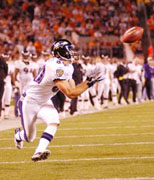 |
|
Ravens wide receiver Brandon Stokley awaits the ball en-route to a 30-yard touchdown reception.
|
For instance, when the Ravens are on offense, Hoffmann watches the linemen. As soon as the ball is snapped, the linemen will tell him if the play is a run or pass.
When the linemen back up with their hands raised, it’s a pass. Then, taking his eye away from the camera, Hoffmann watches quarterback Chris Redman. As Redman focuses on wide receiver Brandon Stokley, Hoffmann goes back to his camera and finds Stokley through the lens just before the ball arrives.
It’s a 30-yard reception. Hoffmann follows Stokley as he grabs the ball, pulls it in and dives for the touchdown. The Ravens are up 7–0 in the second quarter.
The Ravens dominate the game, and their lead keeps growing. Running back Jamal Lewis, who missed last season with a knee injury, is showing his old form.
When offensive linemen Edwin Mulitalo and Jonathan Ogden rush forward, Hoffmann knows it’s a running play.
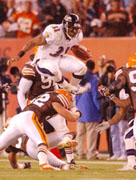 |
|
Ravens running back Jamal Lewis leaps over the defense.
|
“Mulitalo and Ogden are so big and powerful that the Ravens tend to run Lewis behind them,” he says. Lewis charges from the backfield, and Hoffmann is ready.
At the end of the third quarter, the Ravens are leading 23–0.
But the Browns score three touchdowns in the fourth quarter. Suddenly, it’s a close game.
“We assumed we would win, and then it got really tense,” Hoffmann says. “The players on the bench are getting tense, and I’m exchanging nervous glances with other Ravens support people standing on the sidelines.”
In the final seconds of the game, the Ravens cling to a five-point lead as the Browns drive down the field.
“You get caught up in the emotion of it,” says Hoffmann. “The Ravens organization makes you feel like you’re part of the team, that it’s a collective effort by everyone, no matter your role. But when the play starts, I have to be ready to capture whatever happens.”
No matter how exciting the game or how close the call, a sideline photographer never cheers for his team.
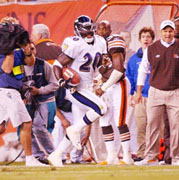 |
|
Ravens safety Ed Reed dances after a game-saving pick-off in the Browns end zone.
|
Concentrating on the final play of the game, Hoffmann captures safety Ed Reed’s game-saving interception in the end zone.
11:45pm ~ Game over
After the game, Hoffmann rushes onto the field where the Ravens players talk with friends and college teammates playing for the Browns. They all want Hoffmann to take their buddy photos.
Monday,October 7, 2002
12:00–12:45am ~ Hoffmann packs up his gear, says good-bye to his classmate and heads to the press box, where he uploads the pictures to his laptop. He keeps his eye on his watch, because the Ravens team bus leaves for the airport exactly one hour after the game ends.
12:45am ~ The Ravens team bus leaves for the Cleveland airport
On the flight home, Hoffmann selects 25 photos to be uploaded to the Ravens’ website. After burning a CD of those photos and handing it to publicist Lubera, Hoffmann can relax for the rest of the trip.
2:30am ~ The Ravens plane arrives at BWI
3:30am ~ Hoffmann arrives home
10am: After six hours of sleep, Hoffmann heads to work at Navy. This afternoon, he’s photographing the Navy basketball team poster; tonight he’ll edit the pictures from the Ravens game; tomorrow there’s a Navy soccer game and on Wednesday …
Bay Weekly regular Nancy Hoffmann, also a Naval Academy graduate, carries her husband’s equipment when he’s shooting at home.
Copyright 2002
Bay Weekly
|